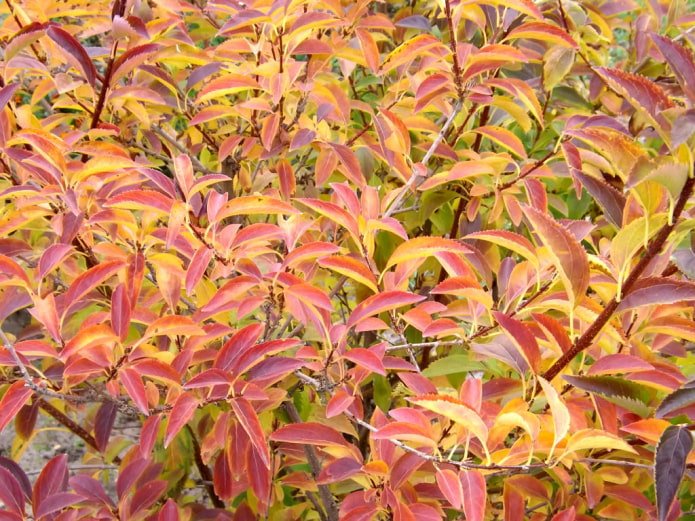Viburnum
The ancient Slavs considered viburnum a symbol of love and beauty. An unpretentious bush with lush inflorescences in the summer, in September it turns burgundy, yellow and brown-golden tones. Viburnum is also decorated with glossy red berries, which are actively used in everyday life by many housewives.

Thunberg barberry
This bush is famous for its leaves of an unusual color – from green to red-violet with a contrasting border or veins. In the fall, the leaves change their color to orange and rich red tones, which makes it even more decorative. Unpretentious, responds well to pruning and grows well in a shady garden.


Mahonia aquifolium
A shrub that reaches no more than 1.5 meters in height with leathery, pinnate leaves. In spring, it is decorated with bright yellow inflorescences, and some varieties bloom again in autumn. Usually, by the end of summer, the Mahonia produces bluish-gray fruits, and the crown becomes red-bronze. This is a great choice for a shady garden.

Cotoneaster
An ideal option for a hedge. Cotoneaster bushes as part of a landscape composition will delight you all year round: some varieties have evergreen foliage with red or black berries. Depending on the season, the leaves are colored in different shades: from bright orange to dark burgundy.


Fluffy Sumac
In summer, the foliage of this unusual shrub is green, and its shape resembles a tree fern. It looks very picturesque and will decorate any garden plot. In September, it turns orange or bright burgundy. It looks great on the lawn and among conifers.

Elderberry
The plant is a bush or a small tree from 2 to 6 meters high. In our climate, the black elderberry (“Black Tower”) looks most impressive – with large leaves and fragrant flowers. In autumn it is decorated with berry-like black fruits, and the purple leaves become reddish-brown.


Euonymus
In summer this shrub is painted in green tones, but in autumn its foliage becomes bright pink with red and purple hues. Euonymus does not require complex care and pleases the eye throughout the summer cottage season.
In landscape design, it is used to decorate fences or outbuildings. In the garden, euonymus is often used to create a hedge.


Irga
A tall shrub, reaching 3-4 meters in height. The irga is unpretentious and grows successfully in any soil. The plant pleases not only with its lush flowering in the spring, but also with tasty berries in the summer. And when autumn comes, the leaves of the irgi turn red, in some places even burgundy.


Physocarpus viburnum-leaved
An ornamental shrub with spreading branches that are beautifully lowered to the ground. The size usually does not exceed 3 meters in height. And thanks to the variety of varieties, every summer resident can find a suitable one, for example, the “Amber” variety turns crimson in the autumn, and “Diablo” retains the purple color of its leaves in the summer and autumn.


Oval-leaved privet
The plant resembles boxwood, and its main feature is that the bush retains its green cover until late autumn. Emerald foliage mixed with resinous berries remains on the branches for a long time, thereby prolonging the life of the garden. Most summer residents use it to form hedges.

Forsythia
Flowering begins in early spring: the branches of the bush are covered with lemon-yellow flowers that attract attention. Forsythia is often used as an addition to flower beds and landscape compositions. It pleases with its color not only in spring, but also in September, when the foliage acquires a bright golden color.


Bodinieri’s beautyberry
The spreading bush colors the garden palette with purple colors with the help of many small purple-lilac berries. The bush reaches a height of 1.5 to 3 meters, has long dark green leaves and is therefore of little note in summer. But in the second half of September, the beautyfruit pleases with its unusual appearance, and the berries stay on the branches until winter.


Dogwood
This favorite of gardeners has gained popularity due to the unusual color of its leaves with a yellow or white border. In autumn, the foliage with light markings becomes a rich pink.
The most decorative variety is considered to be the blood-red variety “Compressa”, which turns into a bright crimson color in September.

Japanese spirea
An amazing plant that changes the shades of its foliage throughout the summer season: bronze in spring, rich yellow in summer, and turns golden in September. Spring variegated coloring appears in varieties that have bright colors throughout the summer. Some varieties of spirea do not shed their leaves until the first snow and look very beautiful against its background.

Snowberry
A bush with snow-white or pink fruits looks simply delightful in autumn and winter. Flexible branches covered with dense balls of berries give them a decorative look. Snowberries are medium-sized bushes, not exceeding 1.5 meters. They easily survive frosts, and their fruits serve as food for birds.


The onset of autumn is not a reason to be sad, because to replace your favorite flowers in the garden, you can plant beautiful plants with bright foliage and unusual fruits. Red, yellow and purple shades will create a great mood and decorate your garden plot.
Now reading:
- Home Remedies for Removing Grease and Stains That Can Damage Kitchen Cabinets
- Installing Paper Wallpaper Yourself: Step-by-Step Guide with Photos and Videos
- Gas stove in the kitchen (33 photos): unique solutions and design tips.
- 14 Advantages and Disadvantages of Frame Houses, Including Controversial Aspects
- Ford Focus: A Compact Car with Style and Performance